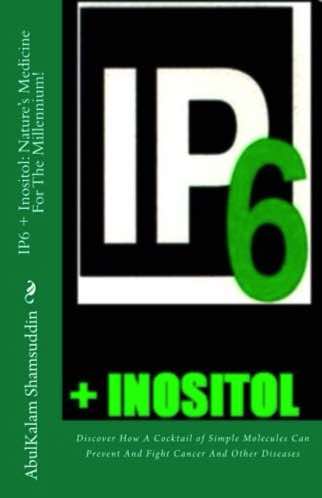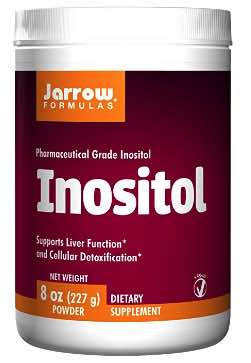I bet you haven’t heard about inositol, a supplement that have many remarkable benefits. But don’t worry, because most people haven’t.
I can also bet that taking this supplement will improve your health and raise your quality of life. Sounds interesting?
Table of Contents
What is Inositol?
Inositol is a naturally occurring nutrient that can be found in numerous forms. Although it is often referred to as a vitamin in the supplement industry, it is not actually a vitamin for humans; however, it is an essential nutrient to the growth process of rodents. Humans have the capacity to generate the physiological production of inositol in the body, a process that is done through the use of glucose.
If you want to learn more, I can recommend this highly rated book:

Benefits of Inositol
There is an increasing amount of research that suggests some rather remarkable benefits of inositol. Some noted benefits of taking this supplement are:
- It effectively treats the symptoms of bipolar disorder
- Plays vital role in metabolic regulation
- Treats the symptom of depression
- Engages the negative effects of male impotence
- Able to reduce the symptoms associated with obsessive-compulsive disorder
- Positively impact lung cancer
- Positively impact the inhibitor receptors of the brain, subsequently reducing symptoms associated with anxiety and panic disorders
- Treatment of polycystic ovary syndrome (PCOS)
The benefits associated with using an inositol supplement extend far beyond the aforementioned benefits. Due to the fact that this naturally occurring nutrient is a direct precursor of phospholipids — an essential component of cell membranes, it has the capacity to assist the body in maintaining its proper electrical energy. Additionally, it also assists the body in the nutrient transfer that takes place across cellular membranes. This nutrient also has the capacity to function as a lipotropic, which means that it can convert fats into a number of other useful biological products.
Treating ADHD
One significant benefit that has been associated with the use of inositol is the fact that it has the capacity to treat a number of mental disorders. One mental disorder that it has shown a great deal of promise with is attention deficit disorder. In a double-blind study, 11 children, with a mean age of nine years, participated in an eight week trial in which a dosage of 200 mg/kg body weight. The results of the study revealed that those who took the supplement showed a slight reduction in symptoms as opposed to no change in those who took the placebo.

Breast Cancer
In studies that are involved in determining the impact of Inositol on breast cancer, the focus was not placed so much on treating the disease as it was about improving quality of life. In fact, the tumor marker and red blood cell counts in the patients who participated in the studies were not altered by the consumption of inositol.
However, breast cancer patients who took inositol experienced a much higher quality of life and an increased level of functionality, allowing them to effectively carry out their daily activities.
Food and Diet
We naturally consume small levels of inositol through our diet, and this is done through the consumption of animal and plant products. For adults who are on a mixed North American diet, the natural daily consumption of inositol is approximately one gram per day. Some foods in which this nutrient is commonly found in are:
- Nuts
- Fruits
- Proteins, such as meat and fish
- Numerous plants, including cruciferous vegetables
There were similar studies conducted to determine inositol’s impact on other conditions, including impotence, OCD, heart disease and more. The studies on heart disease have been inconclusive at this point, which means that more research is required to draw a lucid conclusion. As far as impotence is concerned, the nutrient was proven to have therapeutic properties that were sufficient to help prevent erectile dysfunction in diabetic men.
Side Effects of Inositol
Inositol is considered safe for use as far as adults concerned. Some common inositol side effects are relatively light in nature, including:
- Nausea
- Tiredness
- Dizziness
- Headaches
It is worth noting that currently, there is not enough scientific data to determine the impact that inositol can have on women who are pregnant or breastfeeding. So, until more data is produced in this area, it is best for women who are either pregnant or breastfeeding to avoid use altogether.
When an anatomization is conducted on the benefits of inositol and the possible risks associated with its use, it is apparent that the benefits far outweigh any possible risks. The research on this nutrient is still in the infancy stage, and there is much still to be learned; however, what is known to this point presents a very promising portrait.
Where to Buy Inositol?
If you have decided to give this supplement a try, the next step is to make a purchase. I personally always check Amazon.com first when it’s time to buy something. And it’s no difference in this particular case. If you click this link to Amazon, you will be presented with a long list of highly rated inositol supplements to choose from. Use the customer ratings (1-5) to find the gems!
Good luck! 🙂


